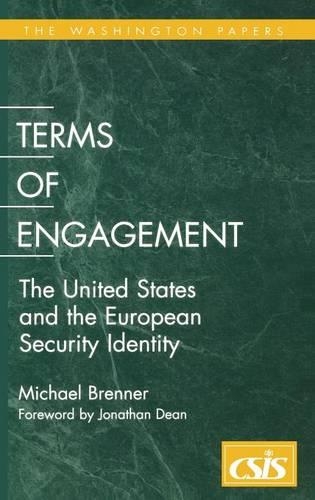
Terms of Engagement: The United States and the European Security Identity
(Hardback)
Available Formats
Publishing Details
Terms of Engagement: The United States and the European Security Identity
By (Author) Michael Brenner
Bloomsbury Publishing PLC
Praeger Publishers Inc
30th October 1998
United States
Classifications
Tertiary Education
Non Fiction
Military and defence strategy
327.4073
Physical Properties
Hardback
144
Description
Michael Brenner examines European effortsand American responsesto reduced defense dependency in a post-Cold War world. Unresolved questions abound: institutional form, political direction, resources, andabove alluncertainty about the place of the United States in security arrangements for and with a new Europe. As he makes clear, the culture of transatlantic security dependency casts a shadow over the ongoing project of reequilibrating the Euro-American alliance. U.S. prestige and power weigh all the heavier because of American ambivalence in coming to terms with its allies' ambitions. Agreeing on a conception of European Security and Defense Identity and measures to implement it has three requirements: clarifying a security agenda dominated by political goals; candid dialogue on the apprehensions the transatlantic partners have about each other; and dedication to perfecting multilateralism as the standard behavioral code for a more egalitarian alliance. Giving life to ESDI unavoidably will generate tensions and amplify a European voice that at times will grate on Washington's ears. However, as Brenner asserts, making multilateralism work is the best way to ensure that those negatives are outweighed by the value ESDI has for advancing U.S. as well as European interests. This is must reading for scholars, students, and policy makers involved with European security and international relations issues.
Reviews
"Americans are awakening to the emerging prospect of a new, powerful, and united Europe--not in decades but within the next few years. They could not find a better guide to understanding this new Europe than Michael Brenner's Terms of Engagement. It is current, clear, and readable. The reader comes away with an appreciation for both the NATO and European Union dimensions of the new European equation and with an understanding of the policy implications of broad historical trends."-Stephen F. Szabo Academic Dean, Paul H. Nitze School of Advanced International Studies Johns Hopkins University
"Michael Brenner will not necessarily make many friends on either side of the Atlantic with this critical analysis of the present state of transatlantic security relations, but it should be read as a valuable corrective to the self-serving rhetoric of most political discourse on this subject."-John Roper Professor, College of Europe, Bruges Associate Fellow Royal Institute of International Affairs
"Professor Brenner is one of the most attentive and thoughtful experts on European security affairs in the United States. Terms of Engagement provides a thorough and balanced description of this remarkably complex subject. This is academic research at its best: Brenner's judgments are fair, and he never lets his personal viewpoint interfere with his assessment of facts. Conflicting positions and accounts are presented in a remarkably balanced manner: this is current history written with the detachment and fairness normally associated with traditional historical studies."-Guillaume Parmentier Professor, University of Paris-II Director of Studies and Research Foundation pour les Etudes de Defense (FED)
[H]is careful examination of European uncertainties and inhibitions about assuming wider responsibilities for extra-European security, matched by his detailed analysus of American ambiguity towards any European contribution to policy-making remains largely valid....[A] useful agnostic counterblast to the implausible confidence of the ministerial declarations issued after summits, whether from NATO of the EU.-Survival
[R]esearchers would do well to pick up Michael Brenner's Terms of Engagement. It weaves through the tapestry of United States-European defence relations, and offers a balanced assessment of the difficulties facing both parties as they re-negotiate the terms of the trans-Atlantic 'marriage.'A particulary thoughtful analyst, Brenner shows an understanding of American and European political culture and priorities.-International Journal
"His careful examination of European uncertainties and inhibitions about assuming wider responsibilities for extra-European security, matched by his detailed analysus of American ambiguity towards any European contribution to policy-making remains largely valid....A useful agnostic counterblast to the implausible confidence of the ministerial declarations issued after summits, whether from NATO of the EU."-Survival
"Researchers would do well to pick up Michael Brenner's Terms of Engagement. It weaves through the tapestry of United States-European defence relations, and offers a balanced assessment of the difficulties facing both parties as they re-negotiate the terms of the trans-Atlantic 'marriage.'A particulary thoughtful analyst, Brenner shows an understanding of American and European political culture and priorities."-International Journal
"[H]is careful examination of European uncertainties and inhibitions about assuming wider responsibilities for extra-European security, matched by his detailed analysus of American ambiguity towards any European contribution to policy-making remains largely valid....[A] useful agnostic counterblast to the implausible confidence of the ministerial declarations issued after summits, whether from NATO of the EU."-Survival
"[R]esearchers would do well to pick up Michael Brenner's Terms of Engagement. It weaves through the tapestry of United States-European defence relations, and offers a balanced assessment of the difficulties facing both parties as they re-negotiate the terms of the trans-Atlantic 'marriage.'A particulary thoughtful analyst, Brenner shows an understanding of American and European political culture and priorities."-International Journal
Author Bio
Michael Brenner is Professor of International Affairs at the University of Pittsburgh. He has served as a consultant to the U.S. Department of Defense and the Foreign Service Institute. Professor Brenner has written extensively on security and international affairs topics, his latest works are two edited collections, NATO and Collective Security (1997) and Multilateralism and Western Strategy (1995).
